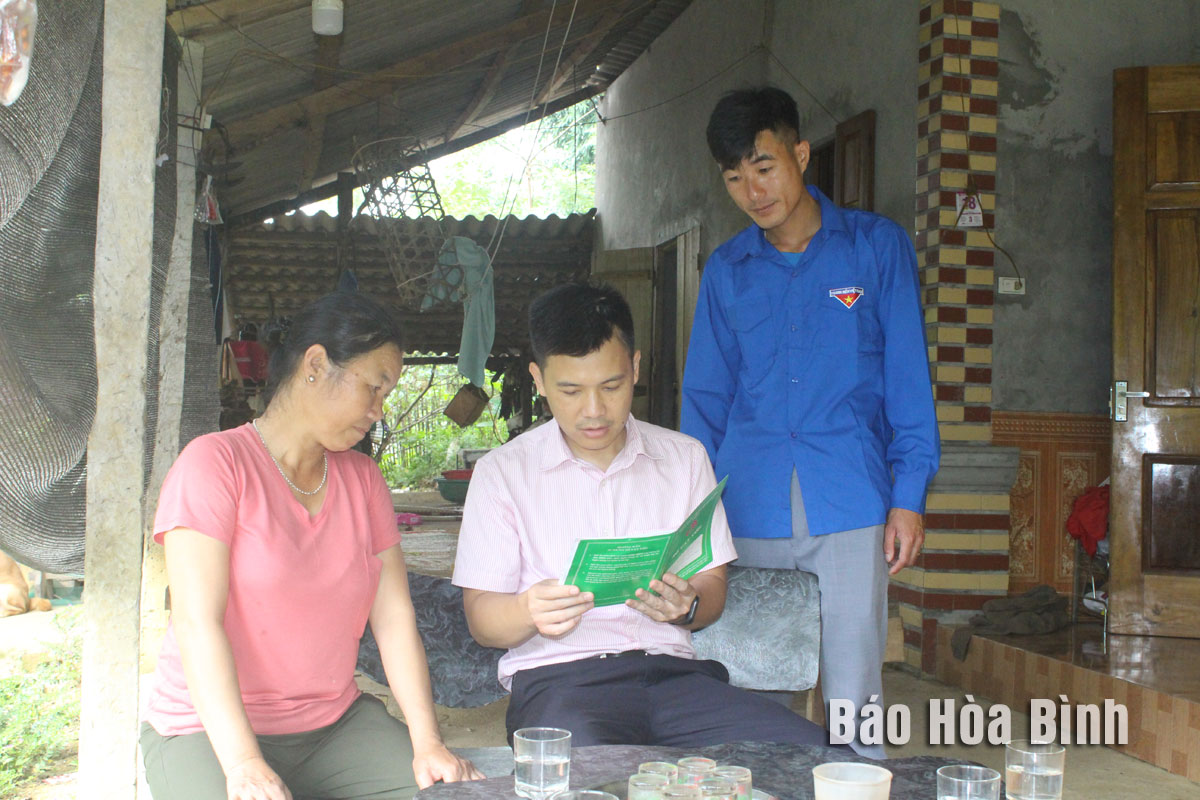
Effective use of concessional loans from the Vietnam Bank for Social Policies (VBSP) has been seen as a "key” for poor households and policy beneficiaries in the mountainous district of Da Bac to improve income and better the quality of life towards sustainable poverty reduction.
An
official from the Vietnam Bank for Social Policies’ Da Bac district branch
studies capital demand from a Da Bac local.
As the only impoverished district of Hoa Binh
province, Da Bac has a great demand for this kind of loans. Over the past
years, Da Bac is one of the localities with the highest amount of outstanding
debt.
To date, total outstanding credit in the
district has topped 546 billion VND (22.58 million USD), with nearly 14,000
customers. During January – October, 1,896 impoverished households and policy
beneficiaries got access to some 75.5 billion VND in preferential loans, helping
them develop business models to get out of poverty.
With 56.7 billion VND of concessional loans
granted to more than 1,000 households, Tu Ly is the commune with the largest
amount of outstanding credit in Da Bac district. From the outset of the year, 240 households in
the commune have been able to take out loans from the VBSP.
According to an official from the communal
People’s Committee, the loans have an important role to play in alleviating
poverty and building new-style rural areas. Meanwhile, Vice Chairman of the People’s
Committee of Hien Luong commune Xa Van Hoe described them as a locomotive for
the residents to improve income, and help the commune meet the advanced
standards of the new-style rural area building.
Xa Van Huy in Doi hamlet invested 100 million
VND that he took from the bank in tens of fish cages. To date, the fish cage
model has earned his family a stable income.
Statistics from Hien Luong commune showed that
total outstanding credit in the commune has neared 22 billion VND so far.
During January – October, the VBSP gave preferential loans to 116 households,
helping generate jobs for 11 labourers and renovate and build 140 clean water
facilities.
Director of the VBSP’s Da Bac district branch
Nguyen Binh Nam said the bank will mobilise more resources to meet the capital
demand of the local residents, contributing to realising the district’s
socio-economic development and poverty reduction targets, and ensuring social
security.
The emulation movement "Hoa Binh joining hands to build new-style rural areas” has been widely spreading, becoming a driving force that motivates the localities to renew rural landscapes and improve the material and spiritual lives of the residents. In this movement, the people play a central role-both as the main implementers and direct beneficiaries of its outcomes.
In response to the global digital revolution, Hoa Binh Newspaper is transforming itself into a modern and multi-platform media hub, blending cutting-edge technology with a restructured newsroom and a new generation of tech-savvy journalists.
Hoa Binh province’s Association of the Elderly recently held a conference to review the project on expanding the inter-generation self-help club model until 2025.
In a move to implement Resolution No. 57-NQ/TW, issued on December 22, 2024 by the Politburo, which targets breakthroughs in science-technology development, innovation, and digital transformation, the Hoa Binh provincial Department of Health has issued a plan to roll out the "Digital Literacy for All” campaign within the local health sector.
An Nghia Commune (Lạc Sơn District) is one of the communes that achieved the tha standard of the national new rural area in 2018. Entering a new development phase, the commune is now trying to meet the criteria for the advanced new rural development. With the strong political will and the public consensus, the commune is gradually overcoming the challenges to reach this goal, aiming for the sustainable development.



